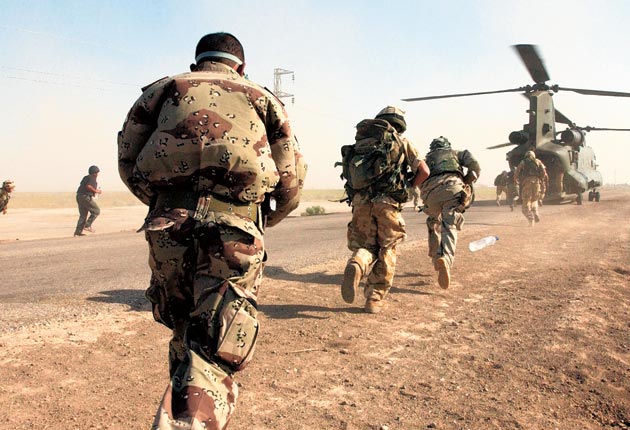High Court to investigate Iraq torture allegations

Iraqis who claim that hundreds of British soldiers were directly involved in widespread torture and abuse have won the first round in their legal battle to force the Government to open a public inquiry.
Judges sitting in the High Court in London yesterday ruled there was an arguable case that the alleged ill-treatment was systemic, and not just carried out at the whim of individual soldiers. The cases before the court include allegations of sexual abuse, mock executions, electric shocks, beatings and, in one case, murder.
Yesterday The Independent revealed the first allegation of water torture and evidence of collusion between British and American military units operating in southern Iraq.
Sir Christopher May and Mr Justice Silber ruled the Iraqis should be given permission to seek a judicial review of Defence Secretary Liam Fox's refusal to order a full public inquiry.
The judges said: "The claimant's case is sufficiently persuasive for permission purposes. It sufficiently makes the case that the alleged ill-treatment may be seen as systemic and raises questions of its authorisation, or failure to stop it."
The court heard there were 102 cases of alleged abuse by British soldiers. James Eadie QC, representing the Defence Secretary, said the Government was already setting up a new team of investigators, IHAT [the Iraq Historical Allegations Team], involving the military police but headed by a civilian and including civilians with criminal investigation experience.
The judges, though, expressed disquiet at the effectiveness of the MoD's investigations: "The... arrangements are not hierarchically or institutionally independent. They do not enable the claimant's sufficient participation. Postponement of a public investigation would not achieve sufficient promptness where some allegations are already quite old, and where there is a substantial risk that IHAT's investigation will not be effective."
Mr Eadie said there was no reason to suggest that IHAT, which cost £6m to establish, was incapable of investigating the Iraqis' allegations promptly and independently.
He said the Defence Secretary had not ruled out an independent public investigation into possible systemic abuse, but that cases against individual soldiers should be investigated first.
But the judges said that any civil or criminal proceedings arising from the IHAT investigations might not properly address the allegations of systemic ill-treatment, and so would not be effective.
They added: "These are matters the Secretary of State will no doubt wish to address by the time of the full [judicial review] hearing."
If the Defence Secretary continues to oppose a public inquiry, the hearing will take place before the same court later this year.
A MoD spokesman said: "The MoD treats allegations of wrongdoing in Iraq extremely seriously. We accept the view of the court that the issues merit a full hearing, but continue to believe that the Iraq Historic Allegations Team is a more effective means of investigating the allegations of abuse than a public inquiry."
Phil Shiner, the solicitor for all the Iraqi claimants, and head of Public Interest Lawyers, a leading public law firm with expertise in international human rights, said: "There are now hundreds of Iraqi civilians making thousands of allegations of being subjected to repeated sexual, physical and psychological abuse. Much of this occurred during their prolonged interrogations by the Joint Forward Interrogation Team in Iraq."
Sam Jacobs, also of Public Interest Lawyers, added: "It is time for the MoD to face up to these thousands of allegations and order the inquiry sought by these victims. We are dealing here not with complicity in torture, but with torture at the hands of the British state."
Case study: Nassir Ghulaim
'A soldier started hitting me with a baton on my knees'
In one disturbing case, Nassir Ghulaim, a young Iraqi, says he was tortured and that his abuse was recorded in photographs taken in Abu Ghraib, the notorious US-run prison camp in Baghdad.
He says he was playing football with friends in April 2007 when he was approached by British soldiers in Jeeps. Their interpreter told two of the Iraqis that the soldiers wanted them to go with them to a British base.
When he arrived at the camp his blindfold was removed and he was surrounded by six to eight soldiers, he says. "The soldiers asked us to pick fights with one another, or fight them. The soldiers were laughing and taking photos. The soldiers then made us squeeze together in a pile, while a soldier stood on top of us and shouted and laughed."
Mr Ghulaim says the soldiers then forced a younger Iraqi to strip naked and they started playing with his penis and taking photographs.
When Mr Ghulaim refused to fight, a soldier kicked him hard on his back and he fell on the floor. "A soldier started hitting me with a baton on my knees and used an electric baton on my body," he adds.
After three days of detention, Mr Ghulaim was freed without charge.
Join our commenting forum
Join thought-provoking conversations, follow other Independent readers and see their replies
Comments